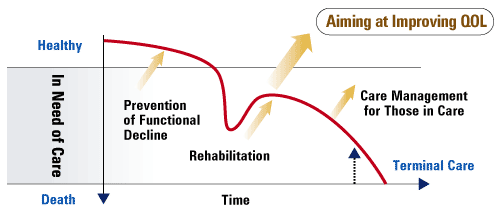|
The aim of our research in the First Domain, the “Establishment of Elderly Care Policy Science,” is to improve the quality of elderly care, an issue that is expected to become more and more important in future welfare society development. Such improvements should be realized not only at the level of practical and individual cases, but also at the level of care service facilities, service providers, and local and central government. Further, it is indispensable to implement the Plan-Do-Check-Action (PDCA) management cycle within all these levels in order to attain sustainable quality improvements (Figure 1). Specifically, at the level of practical individual cases, improvement in the Quality of Life (QOL) is required all through the care process, from sound health maintenance to terminal care (Figure 2). |
| (Figure 1) Establishment of Elderly Care Policy Science Project |
 |
| (Figure 2) Research Topics in Practical Individual Cases |
 |
 |
| The United Kingdom is one of the most advanced countries in terms of policy evaluation. They have developed a benchmark index for welfare, including measuring the effects of government policy and the efficiency and fairness of services. We are carrying out a comparative study concerning evaluation of elderly care policies through collaborative research with the Personal Social Services Research Unit (PSSRU) of the University of Manchester. |
 |
|
To promote Elderly Care Insurance, the self-motivated involvement of local governments and communities is indispensable as they are the actual providers of such insurance. Thus each local government and community must understand how to evaluate the effects of their policies and the usage of their services, and how to resolve any problems identified through such evaluations. The Long-Term Care Insurance Provision Analysis software developed to help governments and communities is now used by 60% of local governments in Japan.
We are currently developing a method to compare the effect of Long-Term Care Insurance and other aspects among local governments, based on data from 146 local governments. The major features of this method are: analyzing the changes between two points of time; use of both existing data, such as the number of Certifications of Eligibility for Long-term Care issued by each government, and data from our additional survey; usage of data from actual individual cases; multi-dimensional evaluations that utilizes seven indexes: (1) regional characteristics, (2) subjects, (3) service availability, (4) service usage, (5) effects, (6) efficiency, and (7) fairness. Our aim in this research is not only analyzing the current situation, but also establishing a Local Government Support System that assists local governments in obtaining such analysis feedback and sharing expertise in planning and developing policies.
|
 |
|
This ongoing study, a joint collaboration with Mie Prefecture, aims at developing a method of evaluating institutional care services by a third party. In the initial stage of this study, we have established an evaluation method of care services in Special Nursing Homes for the Elderly. We have extended the scope of the second stage of our studies to include services in Geriatric Health Care Facilities.
|
 |
| Disparities in social-economic status are no longer problems limited to north-south divisions – it can now be observed among advanced countries. Accordingly, inequalities in health are also increasing. In this research, we attempt to identify the social, economic, and psychological factors that contribute to illness in society and their influential processes in order to gain an intellectual framework to promote welfare society development. This research features: a longitudinal cohort analysis with a large population covering 30,000 participants; a focus on risk factor analysis contributing to loss of health expectancy (i.e. need for care and death); and an attempt to verify the hypothesis that regional characteristics influence individualsf health, as well as personal factors. |
 |
|
This research covers 7,000 elderly persons in care and their caregivers in search of a care management model that assures the quality of life for both the cared-for and the caregivers. Through our research, we found that 20% of those in care are left in a state where neglect and abuse are suspected and also many caregivers are suffering from depression. In the future, we hope to establish a care management plan that prevents further physical deterioration of those in care, by collating the data possessed by insurers (i.e. local governments) such as the Certification of Eligibility for Long-Term Care.
|
 |
This research focuses on analyzing the factors involved in terminal care in different settings, such as at home, in a hospice, in a Special Nursing Home for the Elderly, and in a group’s shared home. The research is also designed to develop care management methods that improve the QOC in such varied environments. So far, we have delivered three investigations on home-visit nursing stations, and an investigation concerning the reliability of the Minimum Data Set for Palliative Care (MDS-PC). We also hold a public research group to assess individual cases in order to suggest terminal care management methods based on our accumulated knowledge.
The aim of this research domain is improving the quality of elderly care, and we hope that our multidimensional studies, centered on policy evaluation and implementing a care management cycle, from policy development to actual care management, will assist in promoting policy science concerning elderly care. |
|
 |


Professor, Social Welfare Course, Graduate School of Social Welfare
Takayuki Hirano |


Professor, Social Welfare Course, Graduate School of Social Welfare
Katsunori Kondo |
|
 |





